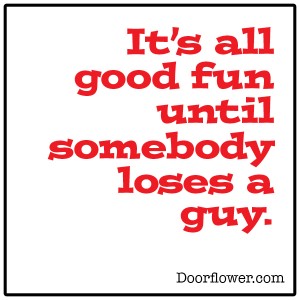One of my favourite memories is my first mashup (at least the first I can recall). I was seven or eight years old, and my sister and I would switch on reruns of The Muppet Show, turn down the sound on the TV, and turn up the volume on the record player, blaring one of our mother’s Motown records—two of our favourite things. Then we’d laugh at how well, and how often, the mouths of the excitable, fuzzy creatures would sync up with the words. (Come to think of it, it was very Jim Henson of us.)
That’s a concept that always made sense to me, combining the things I love. Books with music. Chocolate with peanut butter. Tom Hardy with Henry Cavill (Hasn’t happened yet, but I’m willing it with my mind). I’ve never been a purist. I don’t mind if different foods touch on my dinner plate, if a singer covers a classic song, or when multiple comic book franchises tell the same characters’ storylines three different ways—it keeps things interesting.
Anyway, I’m not sure culture exists without mashups. Where would we be if Henry VIII didn’t have an entire freaking renaissance dominated by French fashion and music? Well, Anne Boleyn would have hung on to her head and been married off to some other rich dude, but we wouldn’t have gotten The Tudors, AKA: An excuse to see Henry Cavill naked. See? Historical fiction plus Henry Cavill equals nature’s painkiller.
So it’s unsurprising my first foray into fiction is a mashup. Coulda, Woulda, Shoulda is an interactive novel where you assume the role of the protagonist and make hundreds of decisions about your love life en route to 60 Happily Sometimes Afters. It’s the result of an encounter with a pick up artist in training, a few dating advice books and a background in video games—an unlikely origin story, but the best ones always are.
I met a guy in a bar, we hit it off, and my friends and I agreed to join him at another bar where he was meeting some college friends. On the way, we stopped by his place so he could change. That’s when I spied a copy of Neil Strauss’ The Game, a book I was vaguely aware was more or less the New Testament for picking up The Ladies. So I wasn’t surprised when, two hours later, my previously attentive suitor more or less (more) began ignoring me in favour of the harem of girls he’d gone to school with.
I was more curious than disappointed. He was a Viagara sales rep—before Love & Other Drugs made it cool—so even if we had dated, my mother would have never let it go farther than that. After all, the woman once forbade me from dating a guy who’s last name was Bedwell.
So I ordered The Game instead. I’m not saying I endorse the techniques in the book, but as far as memoirs go, it was pretty fascinating. I’d also ordered the suggested copy of The Rules so, along with my copy of He’s Just Not That Into You, there were three dating books in my arsenal. And that was already pretty overwhelming. I’m not sure I found more than a handful of agreed upon principles between them—all top sellers at the time.

Playing games was really like a game, I realized. But since I don’t code or draw or whatnot, I decided on a book instead. Like one of those choosable path adventure novels we read as kids. Simple, right?
Wrong. Incredibly wrong. Let’s go back to all of those dating advice books out there, or as I call them, research. I haven’t read all of them, but it feels like I did. I scoured each one for basic philosophies, strategies and techniques. I made note of where they overlapped, and of common complaints and frustrations from men and women alike.
And when I was done, I had books of notes that became the basis for the delicately arranged dating dilemmas and passionate predicaments readers would navigate. From Meet Cute to first dates; first kisses to first fights; and break ups to ‘I do,’ it covers it all.
But it’s not an advice book. The book features a fully-developed protagonist, Elle, her leading man, and a cast of supporting characters. It’s almost a romance novel, in that the plot(s) are rife with angst and conflict—and the really important stuff, like kissing and sex—but where a romance novel guarantees a happy ending, Coulda, Woulda, Shoulda does not. They’re in there, to be sure, but you won’t be tripping over them; getting there is half the fun (and the frustration).
So yes, it was an ambitious undertaking for a debut novelist, and it took eons longer to complete than I’d hoped, due to trial and error, learning how to write, and the fact Life’s automatic pitching machine appeared to be set to “Curve Ball,” but it’s so much more than I’d imagined, too.
In fact, by the time I finished, I’d become so attached to the characters, and realized so much more potential for the concept, I decided to make it the first in a series of interactive novels called Once Upon a Theme. The series will feature the same primary characters from Coulda, Woulda, Shoulda, but Rachel and Valerie, the supporting characters, will each get a feature title from her point of view.
Next mashup? In between “Short Story Long” novellas, I’ll be working on an interactive romance novel satire called Good on Paper.
Until the sequel,
Tara Lee Reed